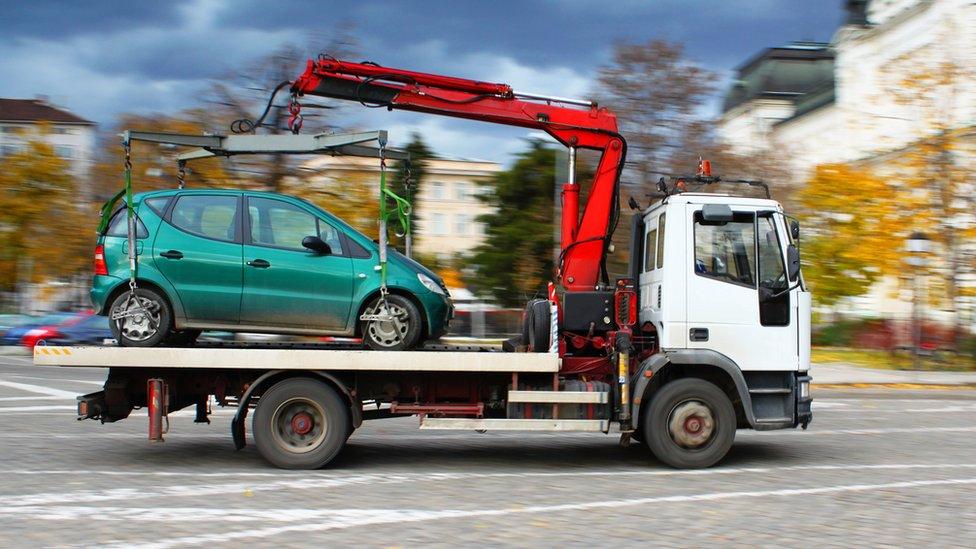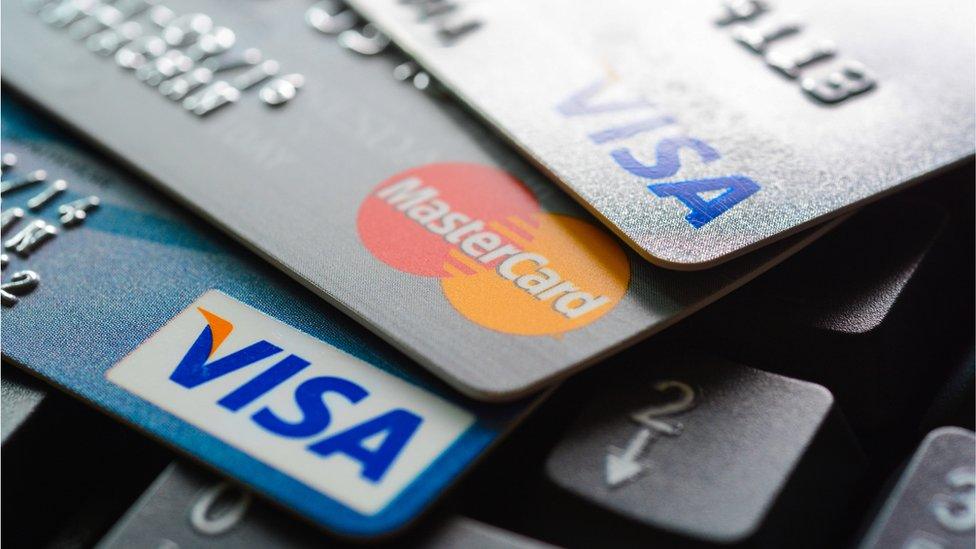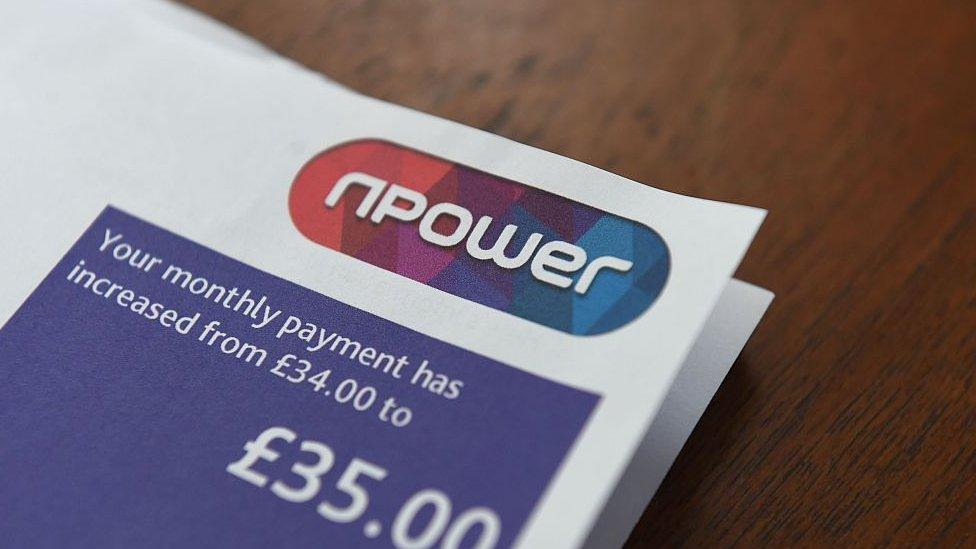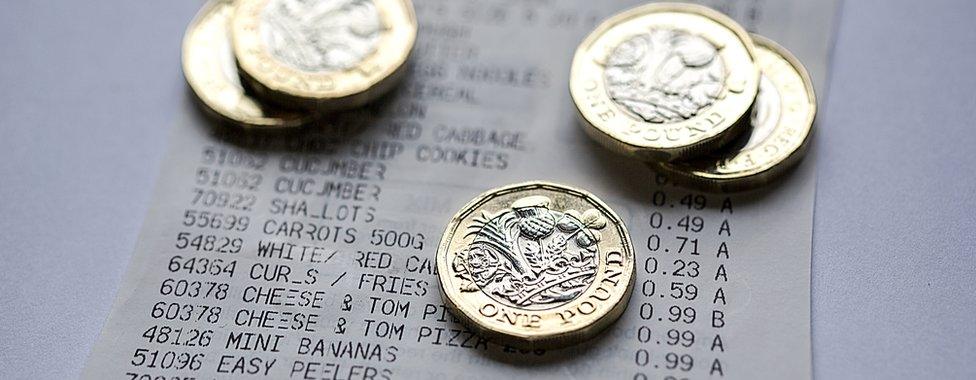When should you start to worry about your debts?
- Published

Imagine a world in which no one could borrow money: no house, no car, no building that extension, and possibly no Christmas presents either.
The ability to borrow is vital. Shylock, you might argue, gave money-lending a bad name.
Indeed much of what we borrow is "good debt" - when the repayments are affordable, and they help us to pay for something over a period of time, like a mortgage for example.
The trouble only arises when those debts get out of hand, and you cannot pay back what you owe. That becomes so-called "bad" debt.
So how can you tell whether your debt is a problem?
First, you need to know more about the nature of the debt you have.
Secured Debt
Some debts are secured against collateral - meaning that if you stop your repayments, you face losing the goods themselves.
So in the case of a mortgage, a bank can force you to sell your house.

If you fail to repay a car loan, it could get towed away
In the case of a car loan, the lender can take your car.
So-called logbook loans are also secured debt, as they provide cash against the value of a vehicle.
Because secured debts are linked to big items, it can be important to repay these ones first.
Unsecured Debt
Unsecured debts are riskier for lenders, as they have no certain way of getting their money back.
Interest rates are therefore higher.
Unsecured debt includes credit cards, store cards, payday loans, most bank loans and peer-to-peer lending.

Credit cards can charge interest of 20% a year
For most people credit card debt isn't a problem, as 80% pay off the full balance at the end of each month.
However for those who don't, interest rates are high - typically up to 20% a year.
So, especially on top of other debts, or loss of income, unsecured debt can easily get out of control.
Payday loans are less of an issue than they once were, as the repayments are now capped.
Priority Debt
Different debts carry different sanctions, so some should be prioritised. The consequences for not paying council tax, for example, can be severe.
"Local Authorities can deduct money from earnings, they can send enforcement officers to your property to remove goods, or ultimately they can look at things like imprisonment," says Jonathan Chesterman, from the debt charity StepChange.
If the worst comes to the worst, utility providers - although not water companies - can cut off your energy supply, so such bills are also a priority.

On the other hand banks can take little action against you if you don't make credit card or loan payments, other than downgrading your credit record.
Student Debt
The level of individual student debt can sound excessive, but it isn't debt in the normal sense of the word.
No one who earns less than £21,000 - soon to be £25,000 - has to pay back a penny.
And since the outstanding debt is written off after 30 years, most student debt will never be fully repaid.
For that reason some experts think student loans should be re-designated as a "graduate tax".
At what point should you worry?
Jonathan Chesterman says there are three clear warning signs that your debt is a problem:
You have to cut back on food
You have no money to put aside at the end of the month
You only make the minimum payment on your credit cards
Another way of measuring the seriousness of your debt is to look at its size relative to your income.
As the chart shows, renters have the highest debts, amounting on average to 20% of their income.
Debt charities measure "over-indebtedness" by estimating the number of people who are likely to find meeting monthly bills a "heavy burden" or who miss more than two bill payments within a six-month period.
Under this measure, there are 8.2m adults in the UK who are over-indebted, amounting to 15.9% of the population.
Insolvency
Anyone worried about their debts should seek professional advice. The following organisations provide free help:
If you live in England and Wales, and it looks like you will not be able to repay your debts, you may be offered one of three insolvency options: bankruptcy; individual voluntary arrangement; and debt relief order.
Bankruptcy
This is the most serious option, which involves an official receiver being appointed to sell off your assets to pay your debts. If you own a house or a car you may lose them.
The bankruptcy will affect your credit record for at least 6 years. But after one year all your debts will be written off. The procedure currently costs £680, but you can pay in instalments.
Individual Voluntary Arrangement (IVA)
Under an IVA, an insolvency practitioner will help you strike a deal with your creditors, which allows you to pay off your debts over a fixed period - say five years. Once approved, all interest on unsecured debt is frozen.

There is less stigma with an IVA, and a greater chance of you keeping your home.
Debt Relief Order (DRO)
This form of insolvency, introduced in 2009, is the easiest of all. Your debts must not exceed £20,000. If your application is accepted, your debts will be frozen for one year, then written off.
A DRO costs £90.
Scotland
If you live in Scotland, bankruptcy is known legally as sequestration. However there are three alternatives: A Debt Arrangement Scheme, A Debt Management Plan, or a Trust Deed. Further details can be found here, external.